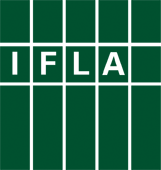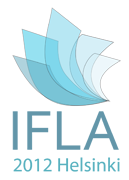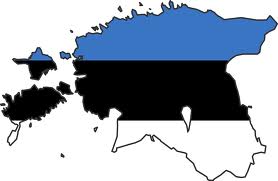 |
World Library and Information Congress:
78th IFLA General Conference and Assembly In Helsinki, Finland from 11-17 August 2012
IFLA's Library Services to People with Special Needs Satellite Program
The Homeless and the Libraries - The Right to Information and Knowledge For All |
 |
Tallinn Central Library
Tallinn, Estonia, 10 August 2012
09:00 AM - 04:00 PM

Colleagues from around the world are invited to participate in the Satellite Program sponsored by IFLA's Library Services to People with Special Needs (LSN) Section and Tallinn Central Library in Tallinn, Estonia.
In 1990 the American Library Association approved Policy #61, Library Services to the Poor. This policy was created based on the belief that “it is crucial that libraries recognize their role in enabling poor people to participate fully in a democratic society, by utilizing a wide variety of available resources and strategies.” The policy, overseen by ALA’s Office for Literacy and Outreach Services, includes sixteen objectives to accomplish this goal, from promoting food drives to eliminating fees for those who can’t afford to pay them, as well as creating low-income programs and services.
The “Poor People’s Policy,” as Policy #61 is called, is a statement of belief and a list of general tenets that all libraries are encouraged to adopt, similar to the Library Bill of Rights. However, as Sanford Berman described in a 2006 article in "Street Spirit," the Poor People’s Policy has not been accepted as widely as that older document. Berman’s observations on the tension between library ideals and reality are an insightful and passionate reflection of our profession’s unintentional hypocrisy. Library services, in general, serve the haves and exclude the have-nots, a circumstance he labels “classism.” Examples of classism include the small number of libraries carrying major serials on homeless issues; the fact that libraries in the lowest income areas are often open the fewest hours; and policies and laws banning “offensive body odor,” bathing, or sleeping.
How do librarians measure the impact of what they do? What have we learned about evaluation and assessing impact the homeless may gain through active participation at their local public library. Libraries, especially public libraries, can play a major role in initiating, partnering and/or seeking out new ways to support the homeless in their community. Libraries can actively experiment with a variety of approaches and adjusting services and programs based on the feedback they receive. Libraries can take the lead within communities in building an environment of sensitivity and accommodation, to embrace the Poor People’s Policy and serve as model examples of a library-community agency partnership created for the benefit of the homeless in their areas. Come to this full day IFLA Satellite Program and learn how your colleagues in libraries around the world are addressing homelessness.
COST TO PARTICIPATE: 25 Euros payable at the door (Sorry, no credit cards or checks) IFLA Registration is not required.

co-sponsored by the Tallinn Central Library
Tallinna Keskraamatukogu
Estonia pst 8
Tallinn, Estonia 15044
Phone +372 6830900
http://www.keskraamatukogu.ee/?lang=en



